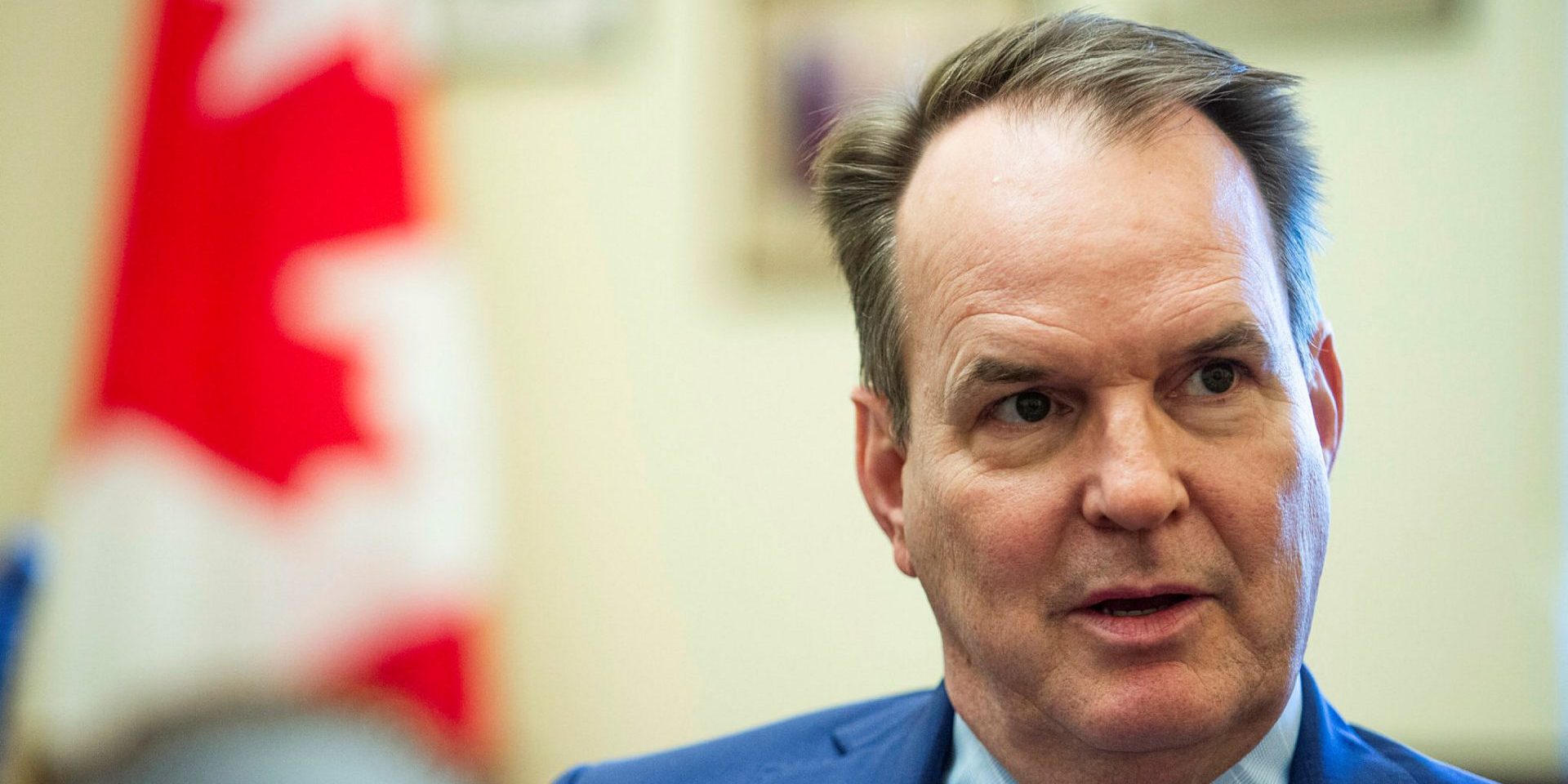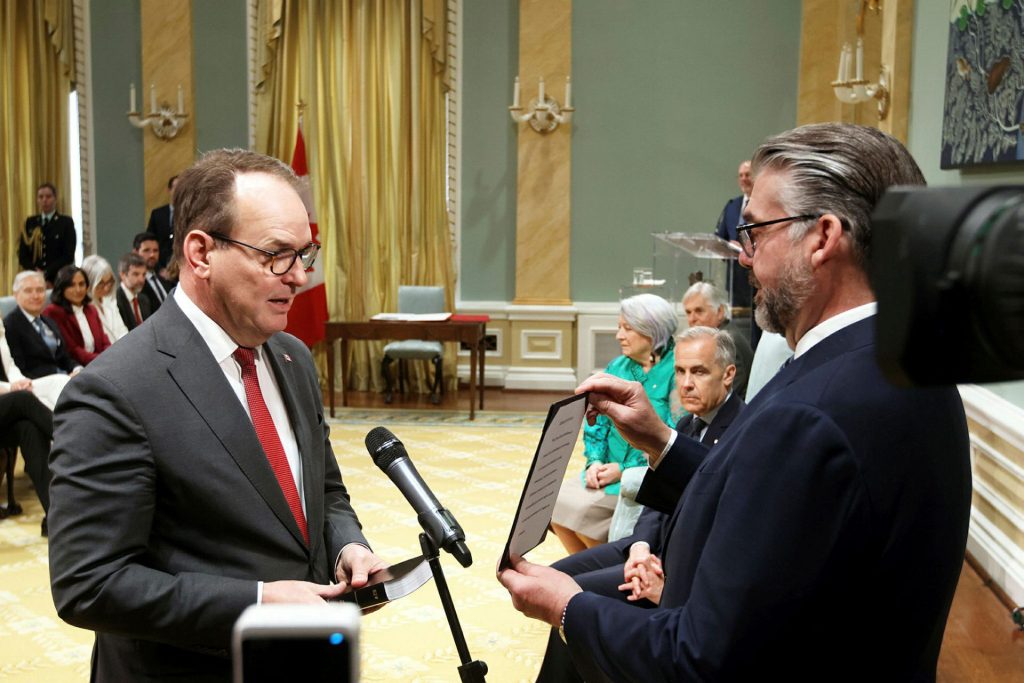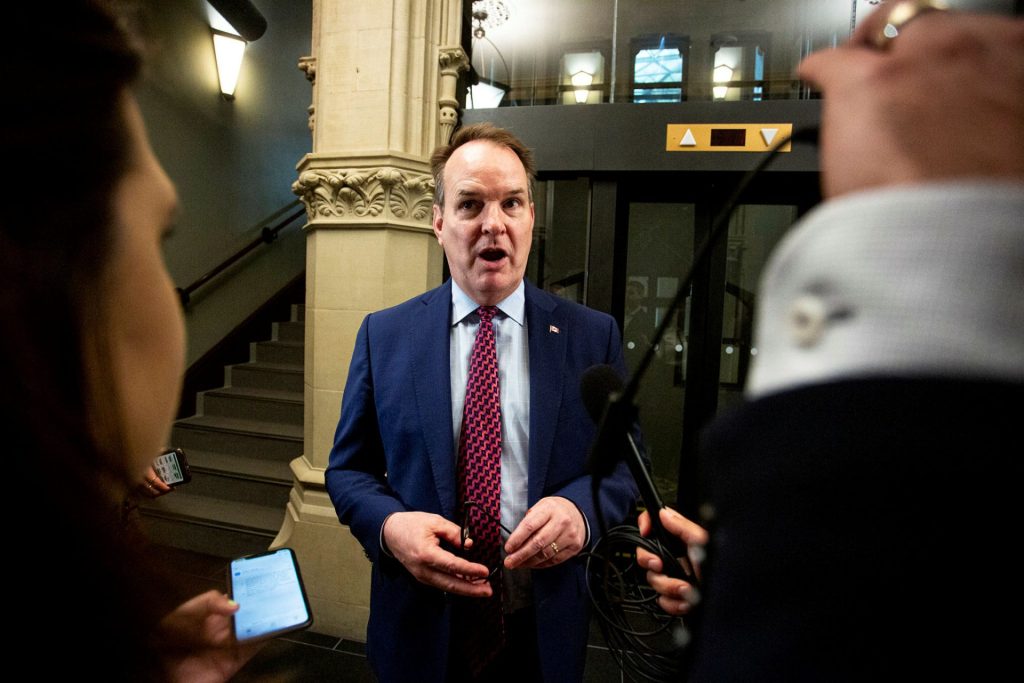House Leader MacKinnon looks to hit the legislative ground running

Quebec MP Steven MacKinnon is back in the government House leader’s chair for a third time—his first in a permanent capacity during a sitting Parliament—and after months away, new parliamentary dynamics to navigate, and some lessons learned under his belt, he says he’s ready to “get things done” with the Liberals’ “big, expanded new team.”
“It never gets old to serve this place, to serve my government in this way, and we have an exciting agenda that I’m really happy to be able to help pilot,” said MacKinnon (Gatineau, Que.), who sat down for an interview with The Hill Times in his office off a well-trod hallway in the West Block on May 28.
MacKinnon said he’s learned the need for flexibility and “collaborative relationships” as House leader in a minority Parliament, and seeks to “operate transparently.” While he and his House leader counterparts don’t “always agree … they’ll always get the straight goods,” he said.
“At the same time, you have to have an absolute determination to fulfil our commitments to Canadians, our platform commitments, the prime minister’s personal priorities, those of the cabinet and the government, and make sure that those are being expedited,” said MacKinnon.
The seven priorities highlighted in Prime Minister Mark Carney’s (Nepean, Ont.) cabinet-wide mandate letter put a focus on the economy, including establishing “a new economic and security relationship with the United States,” “strengthening collaboration with reliable trading partners and allies around the world,” and removing domestic interprovincial trade barriers. On the latter, the Liberals’ platform pledged to “[u]nleash free trade in Canada by Canada Day by tabling legislation to eliminate all federal barriers to interprovincial trade.” Also by Canada Day, the Liberals have promised to cut the lowest income-tax bracket by one percentage point.
At a Liberal caucus meeting on May 25—the day before the House’s return—Carney told his caucus to expect a “very, very” busy few weeks and months ahead.
“You will have heard the prime minister speak about what we believe is the urgency of some of our agenda items. We have a number of economic imperatives to address, most notably the trading relationships with the United States, but not only those. Housing, obviously, is a big one. Major national projects are a big one. Interprovincial trade barriers are a big one,” said MacKinnon.
With only four sitting weeks carved out in the House calendar for the spring, MacKinnon said the government has several “pretty focused objectives.”
“We’re not trying to overload the agenda, but we do have a lot to get done in a short period of time, and one of those things, absolutely, is the One Canadian Economy legislation [tackling interprovincial trade] that we’ll be bringing into the House here in due course,” he said.
Political watchers can expect other bills, tackling other matters, to also be introduced this spring “that we will debate but probably not pass,” he said. “We’re obviously open to passing them; we’ll see how the opposition reacts.”
After losing “an entire season” as a result of the House gridlock last fall, and then months to prorogation, MacKinnon said he thinks Canadians expect Parliament to be “constructive,” and he’s “going to keep reminding them [the opposition] of that.”
MacKinnon first took on the role of House leader in January 2024 when he stepped away from the government whip’s office to fill in during then-House leader Karina Gould’s (Burlington, Ont.) maternity leave. Gould returned that summer, with MacKinnon subsequently named minister for labour and seniors, and later minister for employment, workforce development, and labour. MacKinnon resumed the House leader post this past January—during Parliament’s prorogation—up until the naming of Carney’s first cabinet in March, at which point he briefly became jobs and families minister. He was returned, again, to the central House role on May 13.

“We want to be a government that meets this very particular moment in time in Canada’s history, and address the challenges that we have. So my marching orders are pretty clear, which is to try and—on the legislative side—make sure our government’s keeping our commitments to Canadians,” he said.
The Liberals have nine more MPs this Parliament—at 169 total—and among them, close to 70 rookies. MacKinnon said his team is working “very hard at integrating” those new MPs “into the team, into a routine, [and] making sure their personal ambitions are fulfilled whether that be digging into issues on committees or filling other parliamentary roles.”
As House leader, Question Period is “certainly the most action-packed time” in MacKinnon’s day when Parliament is sitting. “You have to pay attention; you have to be on your toes,” he said.
Carney has opted to do away with former prime minister Justin Trudeau’s approach of answering all questions posed during QP on Wednesdays, as seen during the first question-and-answer session of the 45th Parliament on May 28.
“What you saw today is us trying to move around the cabinet ranks in terms of giving folks an opportunity to address some of these questions, so that’s what I do primarily, which is to try and have my colleagues … shine,” said MacKinnon.
One opposition complaint heard by The Hill Times regarding the Liberals’ past approach to the House is a lack of attendance by ministers during debate on government legislation—debate which has often been seen to be left to parliamentary secretaries (and one in particular) or other MPs to take on.
Asked whether ministers could be expected to appear more often during legislative debates in the Chamber, MacKinnon said he’s “open to that commentary.”
“Ministers are in the executive, but they’re also legislators, and helping them fulfil their legislative responsibilities as well as their executive responsibilities I think is one role that I can play.”
“But at the same time,” MacKinnon said from the government’s perspective, “we’re not always satisfied that they’re [the opposition] acting with the haste and urgency that sometimes the situation calls for, and Canadians, I don’t think, judge political parties very favourably when all they see is obstruction and delay.”
‘Tiers of involvement’: NDP will stay in House leaders’ loop
With only seven MPs elected on April 28, the NDP no longer meets the threshold for recognized party status in the House—which requires at least 12 sitting members—and as a result hasn’t received funding for leadership offices this Parliament, including to support a House leader, whip, or caucus research bureau.
While early hopes of possibly amending relevant laws and bylaws to grant the NDP recognized party status have since been sunk, interim Leader Don Davies (Vancouver Kingsway, B.C.) has been campaigning for his caucus to get some additional resources to support its work, and has said he’s now looking to the Board of Internal Economy (BOIE), which is responsible for the finances and administration of the House of Commons and has the power to allocate resources to the NDP, should its members so decide.
The BOIE has yet to meet, and most of its new members for this Parliament have yet to be named, but this time will include three Liberals, two Conservatives, and one Bloc MP. On the Liberal side, the known roster so far includes MacKinnon and MP Rachel Bendayan (Outremont, Que.).

The Bloc Québécois previously felt the pain of the loss of parliamentary resources when it failed to achieve recognized status in the 41st and 42nd Parliaments. During the former, the Bloc’s push to receive supplemental resources was shot down, but during the latter, the BOIE agreed to allow Bloc MPs to pool their individual office budgets to create a “caucus co-ordination budget” to support “research and caucus co-ordination activities” for the duration of that Parliament.
Bloc Leader Yves-François Blanchet (Beloeil–Chambly, Que.) and MacKinnon have both indicated they’re open to discussing the possibility of allocating the NDP resources.
“Those conversations are ongoing,” MacKinnon told The Hill Times.
As to what “resources” are being considered, he said there are “several possibilities, whether it’s airtime during debates, during the proceedings of Parliament … or indeed resources [money].”
“We’re approaching those conversations very constructively,” he said.
Despite currently receiving no funds to support a formal House leader’s office, the NDP caucus has nonetheless named MP Alexandre Boulerice (Rosemont–La Petite-Patrie, Que.) to the role.
MacKinnon, who speaks with his House leader counterparts daily, said “we’re getting to know how they’re proposing to function,” but has established a “working-level contact now with the New Democrats.”
“We will do our best to include them in things like giving them the same notice of upcoming issues or scheduling items, that kind of thing,” as the other recognized parties, he said.
Asked whether it would be a different level of contact than the smaller Green Party caucus has had, MacKinnon said, “I think there are tiers of involvement.”
“We deal with a high volume of things here,” and with now only one Green MP, “there are obviously capacity constraints,” he said. “We calibrate how we consult with independents, but we do.”
Still leading a minority Parliament—albeit a stronger one—the Liberals no longer have the benefit of a supply-and-confidence agreement with the NDP, and now have one fewer recognized party at the House leaders’ negotiating table. But MacKinnon said he doesn’t expect much of anything will change “with respect to how we operate generally with opposition parties and bring them into decisions,” schedule business, and dialogue daily.
“[There are] good, strong personal relationships with everyone, including the New Democrats, and we’ll see how it goes,” he said. “It’s early, but we’ll try and set a good tone here.”
The Hill Times






 LICENSING
LICENSING PODCAST
PODCAST ALERTS
ALERTS













